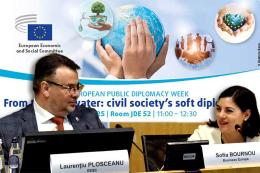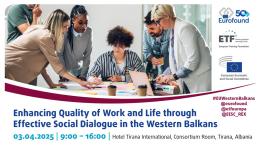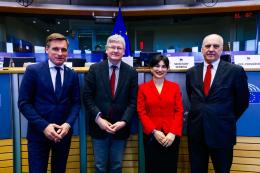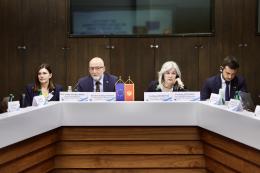European Economic
and Social Committee
Pajjiżi tat-tkabbir
Il-KESE jimpenja ruħu b’mod attiv fil-proċess ta’ tkabbir tal-UE u żviluppa approċċ doppju – reġjonali u bilaterali – għar-relazzjonijiet tiegħu mal-organizzazzjonijiet tas-soċjetà ċivili (OSĊ) fil-pajjiżi tat-tkabbir.
Fejn jidħol l-approċċ reġjonali, il-Kumitat ta’ Segwitu tal-Balkani tal-Punent – korp intern permanenti tal-KESE – huwa l-istrument ewlieni għall-koordinazzjoni tal-attivitajiet tal-KESE f’dan ir-reġjun. Il-Forum tas-Soċjetà Ċivili tal-Balkani tal-Punent, organizzat kull sentejn, jifforma parti mill-ħidma tal-Kumitat ta’ Segwitu.
Il-KESE jaħdem ukoll b’mod bilaterali mal-pajjiżi tal-Balkani tal-Punent u t-Turkija. Abbażi ta’ ftehimiet ta’ assoċjazzjoni bejn dawn il-pajjiżi u l-UE, bil-għan li jiġu involuti l-OSĊ fil-proċessi ta’ qabel l-adeżjoni u ta’ adeżjoni, il-KESE ħoloq tliet korpi konġunti mar-rappreżentanti tas-soċjetà ċivili – mat-Turkija, il-Montenegro u s-Serbja. Kull korp huwa magħmul minn għadd indaqs ta’ membri mill-KESE u mill-pajjiż imsieħeb u jiltaqa’ darbtejn fis-sena.
Il-KESE jżomm kuntatti regolari u jorganizza attivitajiet konġunti mal-OSĊ tal-pajjiżi tat-tkabbir li magħhom ma jkunx għadu ġie stabbilit korp konġunt ta’ rappreżentanti tas-soċjetà ċivili.
Il-ħidma tal-korpi konġunti hija komplementata mit-tħejjija ta’ Opinjonijiet tal-KESE dwar il-proċessi ta’ qabel l-adeżjoni u ta’ adeżjoni tal-pajjiżi individwali, kif ukoll dwar suġġetti ta’ interess reġjonali.









